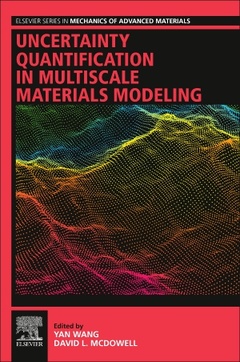Description
Uncertainty Quantification in Multiscale Materials Modeling
Elsevier Series in Mechanics of Advanced Materials Series
Coordinators: Wang Yan, McDowell David L.
Language: English
Subjects for Uncertainty Quantification in Multiscale Materials Modeling:
Keywords
Active learning; Additive manufacturing; Architected materials; Bayesian data analysis; Bayesian error estimation; Bayesian model selection; Bayesian optimization; Bottom-up; Cahn-Hilliard-Cook equation; Chapman–Kolmogorov equation; Concurrent searching method; Constrained optimization; Damage detection; Density functional theory; Density-functional theory; Diffusion; Ductility; Efficient Global Optimization; Elastic constant; Electronic-structure methods; Engineering-scale models; Equation of state; Error bar; Exchange-correlation energy; Fine-scale models; Force field calibration; Fractal dimension; Generalized Poisson process; High throughput analysis; Higher-fidelity geometry models; Integrated Computational Materials Engineering; Interatomic potential; Interval analysis; Interval probability; Jump process; Karhunen–Loeve expansion; Lattice structures; Machine learning; Mass transport; Materials design; Materials informatics; Materials-by-design; Matrix cracks; Maximum entropy; Mesoscale simulation; Metamodels; Model inadequacy; Model-form uncertainty; Molecular dynamics; Molecular simulation; MOOSE; Morphology metrics; Multiscale calibration; Multiscale simulation; Multiscale simulations; Noise; Non-Gaussian; Nonlinear constitutive law; Ogden model; Parameter uncertainty; Phase field method; Phase separation initiation; Plastic strain; Potential energy surface; Predictability; Prediction uncertainty; Random field; Random fields; Random set; Rhenium; Saddle point; Scalable Gaussian process; Shape-memory alloys; Spatial uncertainty; Spatial variations; Spinodal decomposition; Stochastic modeling; Stochastic reduced–order models; Stochastic; Strain energy function; Surrogate modeling; Top-down; Tungsten; Uncertainty propagation; Uncertainty quantification and propagation; Uncertainty quantification; UO2Variability; Verification and validation; Woven composites
604 p. · 15x22.8 cm · Paperback
Description
/li>Contents
/li>Readership
/li>Biography
/li>Comment
/li>
Uncertainty Quantification in Multiscale Materials Modeling provides a complete overview of uncertainty quantification (UQ) in computational materials science. It provides practical tools and methods along with examples of their application to problems in materials modeling. UQ methods are applied to various multiscale models ranging from the nanoscale to macroscale. This book presents a thorough synthesis of the state-of-the-art in UQ methods for materials modeling, including Bayesian inference, surrogate modeling, random fields, interval analysis, and sensitivity analysis, providing insight into the unique characteristics of models framed at each scale, as well as common issues in modeling across scales.
- Uncertainty quantification in materials modeling
- The uncertainty pyramid for electronic-structure methods
- Bayesian error estimation in density functional theory
- Uncertainty quantification of solute transport coefficients
- Data-driven acceleration of first-principles saddle point and local minimum search based on scalable Gaussian processes
- Bayesian calibration of force fields for molecular simulations
- Reliable molecular dynamics simulations for intrusive uncertainty quantification using generalized interval analysis
- Sensitivity analysis in kinetic Monte Carlo simulation based on random set sampling
- Quantifying the effects of noise on early states of spinodal decomposition: CahneHilliardeCook equation and energy-based metrics
- Uncertainty quantification of mesoscale models of porous uranium dioxide
- Multiscale simulation of fiber composites with spatially varying uncertainties
- Modeling non-Gaussian random fields of material properties in multiscale mechanics of materials
- Fractal dimension indicator for damage detection in uncertain composites
- Hierarchical multiscale model calibration and validation for materials applications
- Efficient uncertainty propagation across continuum length scales for reliability estimates
- Bayesian Global Optimization applied to the design of shape-memory alloys
- An experimental approach for enhancing the predictability of mechanical properties of additively manufactured architected materials with manufacturing-induced variability
Dr. McDowell joined Georgia Tech in 1983 and holds a dual appointment in the Woodruff School of Mechanical Engineering and the School of Materials Science and Engineering. He served as the Director of the Mechanical Properties Research Laboratory from 1992-2012. In 2012 he was named Founding Director of the Institute for Materials (IMat), one of Georgia Tech’s interdisciplinary Research Institutes charged with fostering an innovative ecosystem for research and education. He has served
- Synthesizes available UQ methods for materials modeling
- Provides practical tools and examples for problem solving in modeling material behavior across various length scales
- Demonstrates UQ in density functional theory, molecular dynamics, kinetic Monte Carlo, phase field, finite element method, multiscale modeling, and to support decision making in materials design
- Covers quantum, atomistic, mesoscale, and engineering structure-level modeling and simulation




